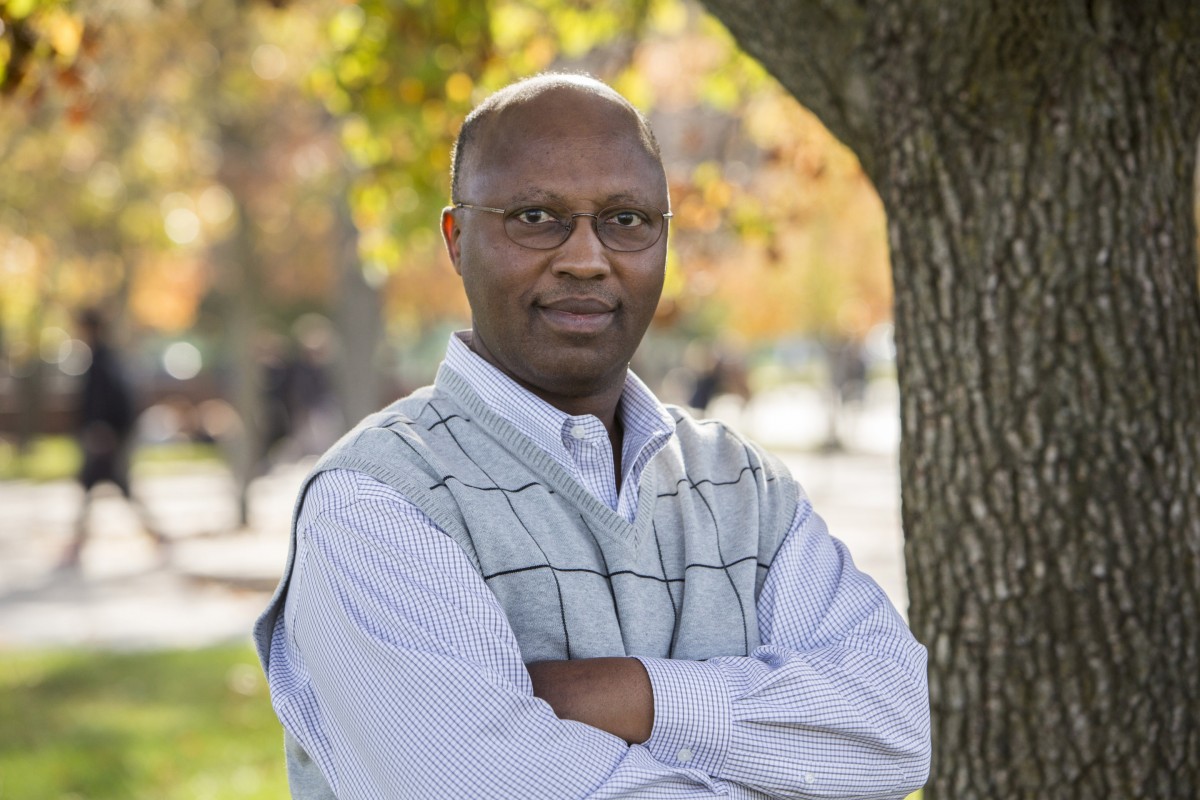Laying the groundwork: Can the Congo build its own stock market?

Currently, there are 29 stock exchanges, including two regional exchanges, on the African continent. Several countries have either their own stock markets or belong to a regional stock exchange, which fuel their economies and provide a way for individuals to invest in their country’s future.
The Democratic Republic of the Congo (DRC) isn’t among them. That’s something that Binghamton University Visiting Assistant Professor of Economics Charles Sebuharara would like to see changed.
On Nov. 13, he gave his first international public lecture on stock markets and how they could be introduced into the DRC. It was held on Zoom from the basement of his home and in French, one of his native languages.
Sebuharara is originally from the DRC, and earned his bachelor’s degree in financial management at the University of Kinshasa. After earning his master’s and then his PhD in economics at Binghamton in 1991 and 2005, respectively, he spent two years teaching in Binghamton University’s School of Management before heading to Virginia Tech for postdoctoral studies in finance. At the completion of this program of study, he taught in Virginia Tech’s Department of Finance and for Wake Forest University’s Business School, before returning to Binghamton in 2014. Sebuharara currently also serves as a member of the Investment Advisory Committee of S.E.E.D. Planning Group, LLC., a local financial firm.
Sebuharara organized the lecture at the request of some of his former colleagues in the DRC. It was partly inspired by the findings of his undergraduate thesis work on bank credit and investments, and his postgraduate teaching and research work, including his doctoral thesis on aspects of macroeconomics and financial reforms in developing countries. His lecture was attended by a diverse audience from the DRC, the United States and Canada, including professors, a bank executive and a senator from the Congo, as well as the national president of that country’s accounting board.
A former Belgian colony, the DRC has a variety of natural resources, along with well-educated and talented people, Sebuharara pointed out.
“In the Congo, you have many brilliant people with great ideas — entrepreneurs — but unfortunately, the country lacks a robust system that can help them implement those ideas and take them to even higher levels of business success,” he said.
Planting the seeds
Before Sebuharara moved to the United States, he worked for the Central Bank of the Congo, where he was among the first staff members responsible for the implementation of the early government treasury bonds operation, which could have become the precursor of a true securities market in DRC. The initiative has proved unsuccessful. One of the reasons, Sebuharara said, is that the DRC lacks a secondary market where newly issued bonds can be freely traded; such a market would create liquidity, an important feature of any well-functioning securities market.
To stoke investment, the country first needs to create the conditions for an adequate economic environment and institutional infrastructure. This includes the necessary legal framework to protect property rights and enforce contracts. The accounting profession must also be involved, since they must be able to audit companies that choose to be listed on the emerging stock market. Colleges and universities will also need to develop curricula to educate potential investors, regulators, future financial advisors and other investment professionals.
At the core, a well-functioning securities market relies on transparency, Sebuharara pointed out.
“Even here in the U.S., when companies go public, they must file reports with the Securities and Exchange Commission, where they have to disclose information about their businesses, opportunities, the risks and their financials; that’s how people can gain confidence in the system,” he said.
While creating a stock market is no easy feat, it is certainly within the realm of possibility: Some of the stock markets in Africa were established in countries smaller than the DRC in terms of size, population and the economy.
The American stock market itself had humble beginnings more than two centuries ago, and initially only involved a small group of people and firms, Sebuharara said. Through the years, it expanded and underwent necessary revisions to financial laws and regulations.
“It wasn’t perfect when it started and it’s not perfect today, either, but there have been a lot of improvements,” he said.
Stock markets and finance in general can help individuals and even nations achieve larger, humanitarian goals. Sebuharara often thinks of the American entrepreneur Charles Feeney, who founded the duty-free shops commonly found in airports. The idea made him a billionaire, but Feeney’s goal in life was to give most of that money away before his death. All told, he’s given away more than $8 billion while shunning publicity, and inspired other entrepreneur-philanthropists, such as Warren Buffet and Bill Gates.
“He lived a very modest life and donated to many charities — but in order to achieve that, you need to make money first,” Sebuharara reflected.
That’s why establishing a stock or securities market could be a game-changer in the Congo. While the country may not be completely ready now, Sebuharara hopes officials there will begin the planning process to plant the seeds for the future.
“This kind of system can help the country in the long run, not only by helping the government mobilize resources for important development programs by allowing start-up businesses and corporations to raise much-needed financing to expand — which they might not have been able to raise otherwise — but also by giving people the opportunity to invest in their own country, improve their families’ well-being and grow the economy,” he said. “It can potentially lift many people out of poverty.”

